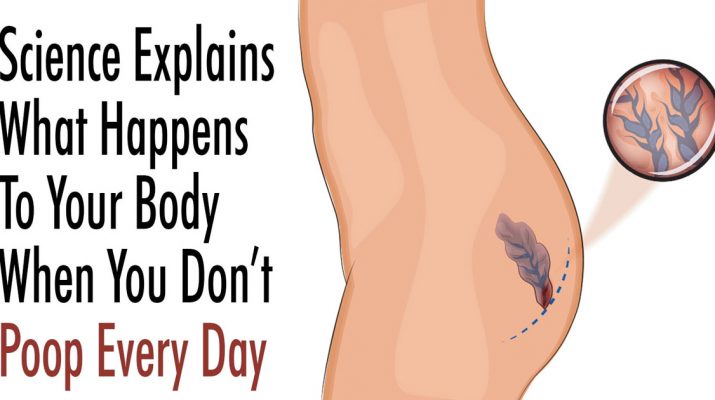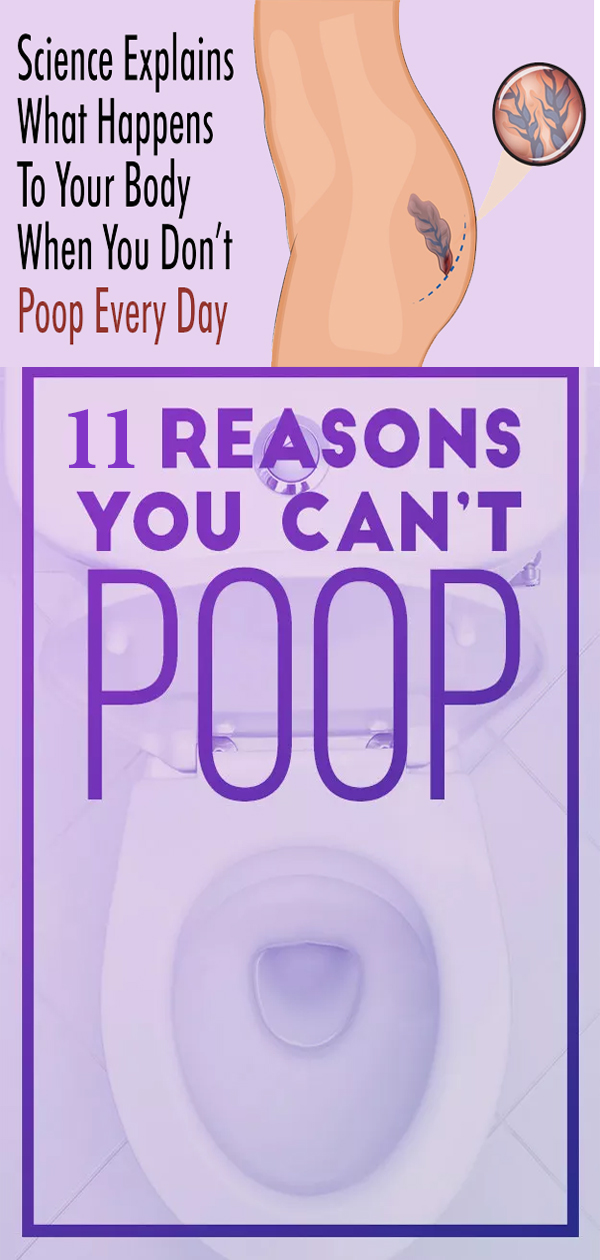If you don t poop every day, then you are suffering from constipation. The condition is characterized by the inability to pass bowel movements as well as the passing of hard stools whenever one is able to carry out the task. Many people claim pain during the process which results from tearing of the muscles around the anus.
Constipation is caused by lifestyle and diet issues as well as diseases. The apparent cause of constipation is the failure to drink sufficient water, which research states should be eight glasses per day. Lack of water means the stool will be too hard to pass, and you will not poop.
Other causes of constipation include lack of sufficient fiber in the diet, no exercises, and more. Some fiber-rich foods include most vegetables, avocado, flax seeds, and apples among others. Here is what happens to your body when you fail to pass stool every day.
What Happens To Your Body When You Don’t Poop Every Day
1. Hemorrhoids
When you don t poop every day, you are likely to strain during a bowel movement. Since you poop infrequently, you are likely to experience a heavy load at a time. Hence, similar to any other muscle that is undertaking a task that surpasses its capacity, you will experience wear and tear.
The length of the intestines consists of smooth muscle fibers that propel waste and food along the gut. When the muscles are exposed to pressure, like during constipation, they also put pressure on the veins that line the rectum.
When you face constipation, these veins are stretched beyond their typical capacity such that they are unable to hold their integrity and shape. At times, they fail to remain in the internal cavity and extend from the anus. This can be uncomfortable and result in bleeding every time you poop.
You can see blood spots on the toilet paper that you use to wipe. At times blood can accumulate in hemorrhoids to cause a painful, hard lump. Also, hemorrhoids can lead to skin tags, infections, and blood clots.
2. Loss Of Appetite
It is common for those people who don t poop to face a loss of appetite. The kind of appetite loss that comes with chronic constipation is not an unpleasant hunger suppression form. Instead, it is a form of appetite loss that makes food consumption appear like a real effort and a complete turn-off.
It is similar to the appetite loss you experience when you are sick. This is because the gut is a well-honed, finely-tuned system of interconnected sections that are continuously sending messages to your organs and brain. Whenever you have a meal, special nerves that line your stomach’s insides are stretched, triggering mass movement.
During mass movement, the stomach nerves send neural signals to the bowels to trigger a bowel movement. The design of the intestines makes them respond by pushing food further through the gut. This explains why you feel the urge to poop immediately after finishing a meal.
But during constipation, there is an interruption of this feedback loop. Instead of propelling food via the gut, the stomach and brain get neural signals that food is backed up. Therefore, it will not be efficient to keep adding food into the gut until the congestion is handled.
Simply put, the body shuts down your appetite until you can poop.
3. Breakouts
Researchers state that there is a relationship between what appears on the skin and what takes place in the digestive system. If you don t poop, it can be a sign that there is some strain on your internal ecosystem of gut flora. When gut flora is not at its best, it can manifest in other ways other than constipation, and the skin can suffer.
Skin conditions like puffiness, dark circles under your eyes, rashes, and acne can originate from internal gut problems. Keep in mind that the skin is the biggest organ in the body and it undertakes some elimination functions.
Hence, toxins that accumulate during constipation or get into the body via an unhealthy diet, can lead to skin blemishes like zits. If the body fails to eliminate toxins through the regular bowel route, it can break out through the skin.
4. Headaches
According to research, constipation is one of the causes of headaches, and this is due to stress. The ability to poop well is a basic function of the human body. When you don t poop, you experience pain, worry, pressure, and inconvenience of being constipated as you feel your gut fill up, bloat, and block, which results in a lot of stress.
This anxiety and stress can lead to tension headaches. Additionally, constipation can also be caused by dehydration. The bowels need enough water supply to generate soft stools.
When you fail to drink sufficient water, the stool can get compacted and dry, leading to hard poop that is popular with constipation. In this instance, while headaches are not directly caused by constipation, the related dehydration can. Hence, hydrating can treat both headaches and constipation.
Moreover, research shows that headaches can result from a buildup of toxins during constipation. The bowels are a primary outlet for the body to get rid of toxins. Hence, if the waste remains in the body for a long time, it can be reabsorbed into the system and lead to headaches.
5. Bad Breath
According to a Danish study, constipation can result in bad breath. The research reveals that about 25 percent of people suffering from bad breath suffer from constipation. Other studies show that people who have constipation have recurrent cases of bad breath or a bad taste in their mouths.
The reasons for this relationship are not fully clear. But a particular theory states that if you have constipation, there can be a proliferation of harmful gut bacteria, which generate malodorous gases. When they get to your mouth, you experience bad breath.
6. Anal Fissures
Straining to pass feces or passing hard ones can lead to tearing of the anus tissue. These tears are referred to as anal fissures. They result in bleeding, pain, and itching.
Since anal fissure symptoms make passing stool harder, they can worsen constipation. This takes place in children who hold in the poop since there are afraid of pain.
The tears are normally very tiny. But at times they can become bigger and impact the muscle ring at the anus opening that keeps the anus closed. This type of anal fissure is difficult to heal.
You might require surgery or medication to treat the condition. After getting an anal fissure, there is a high likelihood of getting another.
7. Impaction
When you fail to pass stool out of the gut, it can begin to congest in the intestines. The hardened stool sticks there and results in a blockage. The squeezing that the large intestines usually uses to get the stool out of the gut can’t work since the mass is too hard and large.
This can result in vomiting and pain. You might even require visiting the hospital for treatment. Fecal impaction is more likely to affect older adults and children.
8. Rectal Prolapse
The rectum is the last part of the colon and ends at the anus. When you keep straining during bowel movements, it can stretch and protrude outside the anus. While only some part of it comes out at times, there are times the whole rectum can come out.
This can be excruciating and results in bleeding. It can be difficult to differentiate between hemorrhoids and rectal prolapse because they both lead to bulging out of the anus. However, the conditions are different and require different treatments.
9. Fecal Incontinence
Fecal incontinence refers to the loss of control when it comes to bowel movements and the involuntarily passing of stool. This is a side effect of severe constipation as a result of constant straining that leads to weak rectal muscles as well as nerve damage. A physical blockage caused by fecal impaction makes the colon muscles to stretch and watery stool deeper in the gut can seep around the hardened stool.
The treatment of the condition involves a prescription of laxatives or the treatment of fecal impaction that causes the incontinence. You need to do pelvic strengthening and bowel training muscles to treat the weakened muscles.
10. Fatigue
Fatigue usually accompanies constipation. This can indicate that the constipation is a result of another medical issue. Constipation can also lead to fatigue if you are experiencing malnutrition.
When the colon holds on to toxins, the body has a difficult time getting nutrients from food. You need to consume a healthy diet rich in fiber as well as do regular exercises. If the situation is severe, ensure you seek medical treatment.
11. Bladder Control
There is a closer link between the bladder and the colon than most people might know. Having a full colon as you have a hard time pooping can lead to impacts on the surrounding organs. According to the University of California’s Department of Urology, a physical position is a problem.
If the full colon puts a lot of pressure on the bladder, the bladder will fail to fill and result in unexpected leaks or eagerness to empty. When you strain during numerous bowel movements, you can ruin the pelvic floor muscles that are essential for proper bladder control.
Conclusion
Loss of bladder control, pain and bleeding when passing stool, fatigue, bad breath, headaches, and breakouts are some of the side effects you will experience when you suffer from constipation. Constipation can be severe when it comes to children who are afraid of feeling pain during bowel movements.
Therefore, to ensure you are free from constipation, exercise regularly, drink a lot of water, and eat foods rich in fiber and healthy fats.


